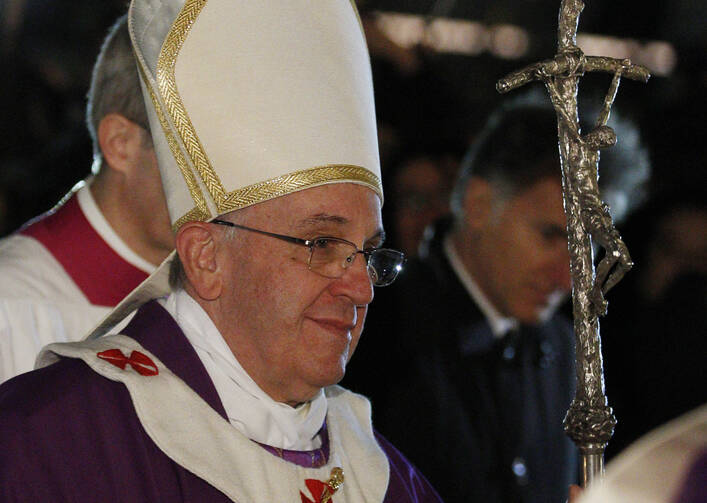When Cardinal Theodore E. McCarrick went to Buenos Aires a few years ago to visit his "classmate," Cardinal Jorge Bergoglio, from the same group of bishops who became cardinals in 2001, he was first surprised that the archbishop personally met him at the airport.
As Cardinal McCarrick, the retired archbishop of Washington, told it at a program at Georgetown University on Pope Francis and the poor on Dec. 2, the future Pope Francis picked up his guest's suitcases and brought them out to the car he'd borrowed for the occasion. Their travels through the city brought them in view of many of the prime tourist points of interest in Buenos Aires.
"We passed all the great sites, but did I hear about them? No," said Cardinal McCarrick. "The only thing I heard was 'under this bridge is the worst slum in the city. I try to visit often.'"
As they passed another neighborhood, the future pope described it as a hotbed of criminal violence and said there'd recently been some murders there. He had tried to intervene in the simmering unrest, Cardinal Bergoglio explained, but to no avail.
In opening the panel discussion about the "Challenges of Pope Francis and Catholic Social Thought for American Poverty," Cardinal McCarrick said Pope Francis' apostolic exhortation, "Evangelii Gaudium" ("The Joy of the Gospel"), published Nov. 26, in short, insists that "the Gospel is good news and we ought to act like it is. Pope Francis is not ashamed to say he wants a church of the poor and for the poor."
Observing that Pope Francis both as pope and before he was elected in March has made a point of reaching out to people in need, Cardinal McCarrick refined the point to say, "he doesn't just reach out to the poor, but to the individuals who are poor."
"He is not one to say 'change the whole society immediately,'" the cardinal said. "but change society and take better care of the person sleeping on the grate, of the woman wearing towels" because she has insufficient clothes.
He predicted the apostolic exhortation could well be the defining document of Pope Francis's papacy.
"He's in a category of his own," Cardinal McCarrick added, "a prophet who sees the world as it is and has the courage to say so."
Cardinal McCarrick's remarks and the discussion following were part of the second major event of the Initiative on Catholic Social Thought and Public Life, a new program to promote the education of a new generation of Catholic lay leaders and to foster discussion about Catholic social teaching.
The evening's moderator and the initiative's director, John Carr, former secretary of the Department of Justice, Peace and Human Development at the U.S. Conference of Catholic Bishops, gave an example of the attention Pope Francis pays to individuals.
When the pope visited Assisi in October, he walked into a room of about 100 people with profound handicaps, Carr said. Instead of giving a speech and greeting a handful of people as would be expected, the pope spent time with each person in the room.
"It looked like Jesus would've acted," Carr said.
Panelist Michael Gerson, a former speechwriter and adviser to President George W. Bush and now a columnist for The Washington Post, author and fellow at the Council on Foreign Relations, said he's been saying Pope Francis is "a troublemaker."
The apostolic exhortation reads like a 220-page preview of what to expect of Francis's papacy, Gerson said, observing "there's nothing more dangerous than a troublemaker with a plan."
Gerson, an evangelical, said he thinks the reason what the pope says and does is so powerful is that "he talks like Jesus and acts like Jesus." As Christians, "that's the source of what we believe."
Gerson said that what the pope has been saying is not new, it's not even unfamiliar, but that it captures the imagination of Catholics and non-Catholics alike because he puts it so vividly through is words and actions.
"A church that looked like this could transform the entire world," he said.
Bishop Stephen E. Blaire, of Stockton, Calif., who just completed his term as chairman of the USCCB's Committee on Domestic Justice and Human Development, said he's been struck by how many people find the words and example of Pope Francis speaks to them.
"He's speaking as a pastor who's been with his people in the streets where they live," he said.
One section of the exhortation that particularly stood out for him, he said, was where the pope quoted St. John Chrysostom's observation that "not to share one's wealth with the poor is to steal from them."
"That raises enormous questions," said Bishop Blaire, such as about property rights and philosophy about dominion over creation.
E.J. Dionne, a Georgetown faculty member, a Post columnist and fellow at the Brookings Institution, quipped that "I love a pope who takes a stand against sourpusses," referencing the exhortation's call to priests to preach without putting people to sleep.
That section told priests that it shouldn't be "torture" to go to confession and encouraged them to get out of their sacristies and get involved in the lives of people, and not to be "sourpusses."








